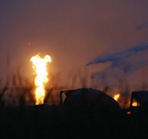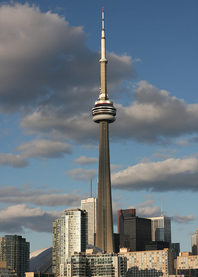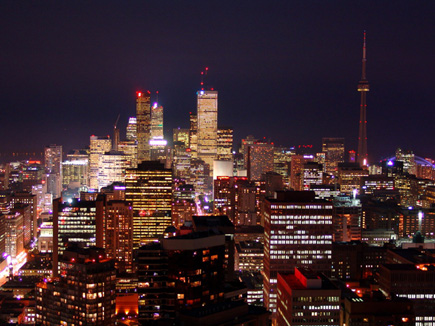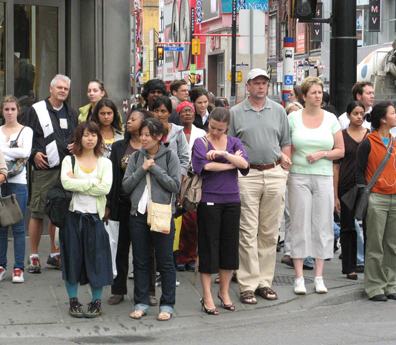The strange good news about Toronto .. and the Sunrise propane explosion!
Aug 10th, 2008 | By Dominic Berry | Category: Key Current Issues TORONTO. AUGUST 10, 2008. (UPDATED AUGUST 12). Punctuated by a dramatic propane plant explosion very early this morning, the news that Forbes magazine has just rated the old Canadian hogtown # 10 among the “World’s Most Economically Powerful Cities” is striking many in this place as a kind of (pleasant enough) joke. Only nine days ago, e.g., local urban critic Christopher Hume was telling us that “Toronto is most decidedly not a city of the future. Indeed, we are stuck in a misty small-town past that has emotional appeal but little connection to reality.”
TORONTO. AUGUST 10, 2008. (UPDATED AUGUST 12). Punctuated by a dramatic propane plant explosion very early this morning, the news that Forbes magazine has just rated the old Canadian hogtown # 10 among the “World’s Most Economically Powerful Cities” is striking many in this place as a kind of (pleasant enough) joke. Only nine days ago, e.g., local urban critic Christopher Hume was telling us that “Toronto is most decidedly not a city of the future. Indeed, we are stuck in a misty small-town past that has emotional appeal but little connection to reality.”
Local cynics and naysayers are also stressing that the people at Forbes themselves have noted how “Toronto only narrowly edged out Madrid, Spain; Philadelphia and Mexico City, Mexico, to hang on at No. 10.” Still, at a time when Canada’s current largest metropolitan region seems less and less influential in Canada itself, it is amusing – locally in any case – to see it suddenly ranked by experts outside the country as a rising force in the wider global village. Could it even be that old “T.O.” or “T dot”(as hipper people seem to say?) is more of a city of the future than many of us who live here currently think? And, btw, how does this relate to that dramatic explosion near Keele and Wilson, in the new inner city’s northwest end?
The propane explosion … looked like a nuclear bomb … ?
 According to the Canadian Press the propane depot at Sunrise Propane Industrial Gases, on Murray Road in the Keele and Wilson region of the present-day official City of Toronto, blew up at about 3:50 AM. this mornming. It was a “powerful …blast” and “burned a huge area of the neighbourhood … with intense heat.”
According to the Canadian Press the propane depot at Sunrise Propane Industrial Gases, on Murray Road in the Keele and Wilson region of the present-day official City of Toronto, blew up at about 3:50 AM. this mornming. It was a “powerful …blast” and “burned a huge area of the neighbourhood … with intense heat.”
According to fire department official Bob O’Hallarn, “given the impact of the blast, the city’s residents got off very lucky. There was a very, very large amount of fire when we arrived and the extent of the explosion if the blast was heard as far away as it was, could have been much more serious … Hopefully we won’t find that there are a lot of people missing or injured but so far it looks like we got off very lucky.”
The CP report carries on: “Residents in the area were shaken out of sleep by a thunderous explosion and vibrant orange balls of fire lighting up the sky … Fearing the air had turned toxic, police used bullhorns to order the estimated 12,500 residents within a 1.6-kilometre radius of the plant to flee their homes immediately …
“Air quality tests later in the day showed the explosion was not toxic, but police continued to ask people to leave the hot spot and take shelter in nearby York University … Some people raced out of their homes still wearing their pyjamas, grabbing only their loved ones and pets. Others piled into cars to drive out of the area to the safety of the homes of friends.”
Some observers of the blast apparently at first thought it might be a nuclear bomb – it was that visually overwhelming. Here are some other reports from individuals writing in to the CP24 News website:
 “That was one huge explosion… I live at Bathurst & Finch and it woke me up. My house was shaking and I thought my windows were going to break. Wow. It’s a miracle nobody was killed.” (Kim – Sadly, as of 4:15 PM this afternoon it has been announced that one veteran Toronto firefighter has died fighting the blaze at Sunrise Propane. And police are apparently reporting one other person unaccounted for.)
“That was one huge explosion… I live at Bathurst & Finch and it woke me up. My house was shaking and I thought my windows were going to break. Wow. It’s a miracle nobody was killed.” (Kim – Sadly, as of 4:15 PM this afternoon it has been announced that one veteran Toronto firefighter has died fighting the blaze at Sunrise Propane. And police are apparently reporting one other person unaccounted for.)
“I live at steels and bathurst and at the time of blast I woke up with a sound of a big bang. When I got out of the bed and looked outside, found everything getting orange ….it’s shocking!!!” (Urfa)
“I was awakened by a big loud sound. It sounded like a huge bomb went off. My husband and I saw the big flare up and just decided to be as far as possible so we left the house at 4:00am.We live in the Dufferin and 401 area.” (Becka)
“I live at Park Lawn and the Queensway and I heard multiple explosions starting at around 3:45am which rattled my windows and scared my dog. I actually turned on the radio to listen to find out if there was an explosion somewhere because I was sure it wasn’t thunder. When they first started announcing it (just before 4am), I was expecting to hear that it was somewhere nearby, so was completely stunned when they said Keele and Wilson! It even woke up my friend who lives on Lake Shore Blvd. W and shook her condo’s windows, so it was heard much further away than 7km!” (Allison)
“I live Oakwood/Vaughan area and it jolted me from my bed. And when I went outside 90% of my neighbours were also awake on the street.” (Tara)
“I was right in the middle of the blast working at Downsview Airport. The blast shook our building and broke many glass. I feel lucky to be alive.” (Mike)
“Can you imagine that if Toronto had been hosting the Olympics this week? People would have thought it was a terrorist act.” (Robert – Toronto did make a failed bid to host the Olympics now taking place in Bejing, China.)
The Forbes list of World’s Top 10 Most Economically Powerful Cities …
 Whatever else, as fireman Bob O’Hallarn has observed, that today’s quite massive propane explosion caused as little damage to human life as it apparently did suggests Toronto is at least a lucky city. (Much as Canada can in many ways be said to be a lucky country?)
Whatever else, as fireman Bob O’Hallarn has observed, that today’s quite massive propane explosion caused as little damage to human life as it apparently did suggests Toronto is at least a lucky city. (Much as Canada can in many ways be said to be a lucky country?)
Luck of some vaguely similar sort may also explain how Toronto managed to get on Forbes magazine’s 2008 top-10 list of the “World’s Most Economically Powerful Cities.” Forbes publishes a great many lists in its magazine and on its website. They all have some interest. But the enterprise is very much an art rather than a science (and no doubt, some unusually rigorous analysts would say, ultimately a somewhat educational entertainment at best).
Joshua Zumbrun’s article “World’s Most Economically Powerful Cities” on the Forbes website presents a reasonably clear explanation of how this particular was put together. Whatever else again, it must mean something that Toronto winds up as # 10.
Here, in any case, is a summary of the complete list and the main data used in its construction:
(1) London, England – Gross domestic product (2005): $452 billion; GDP (2020): $708 billion; Growth rate: 3%; MasterCard Ranking: 1; Population (2007): 8,567,000; Purchasing power (NYC=100): 92%
(2) Hong Kong, China – GDP (2005): $244 billion; GDP (2020): $407 billion; Growth rate: 3.5%; MasterCard ranking: 6; Population (2007): 7,206,000; Purchasing power (NYC=100): 49%
(3) New York, USA – GDP (2005): $1.13 trillion; GDP (2020): $1.56 trillion; Growth rate: 2.2% ; MasterCard ranking: 2; Population (2007): 19,040,000; Purchasing power: 100%
(4) Tokyo, Japan – GDP (2005): $1.19 trillion; GDP (2020): $1.6 trillion; Growth rate: 2%; MasterCard ranking: 3; Population: 35,676,000; Purchasing power(NYC=100): 96%
(5) Chicago, USA – GDP (2005): $460 billion; GDP (2020): $645 billion; Growth rate: 2.3%; MasterCard ranking: 5; Population (2007): 8,990,000; Purchasing power (NYC=100): 115%
(6) Seoul, South Korea – GDP (2005): $218 billion; GDP (2020): $349 billion; Growth rate: 3.2%; MasterCard ranking: 9; Population (2007): 9,796,000; Purchasing power (NYC=100): 56%
(7) Paris, France – GDP (2005): $460 billion; GDP (2020): $611 billion; Growth rate: 1.9%; MasterCard ranking: 7; Population (2007): 9,904,000; Purchasing power (NYC=100): 88%
(8) Los Angeles, USA.- GDP (2005): $639 billion; GDP (2020): $886 billion; Growth rate: 2.2%; MasterCard ranking: 17; Population (2007): 12,500,000; Purchasing power (NYC=100): 120%
(9) Shanghai, China – GDP (2005): $139 billion; GDP (2020): $360 billion; Growth rate: 6.5%; MasterCard ranking: 24; Population (2007): 14,987,000; Purchasing power (NYC=100): 36%
(10) Toronto, Canada – GDP (2005): $209 billion; GDP (2020): $327 billion; Growth rate: 3%; MasterCard ranking: 13; Population (2007): 5,213,000; Purchasing power (NYC=100): 113.8%
Toronto and Canada …
 Ever since the Second World War, perhaps, Toronto’s influence inside Canada itself has been exaggerated by observers both outside and inside Toronto. Montreal, not Toronto, was Canada’s original great metropolis – and its most populous city region down to as recently as the 1976 Census.
Ever since the Second World War, perhaps, Toronto’s influence inside Canada itself has been exaggerated by observers both outside and inside Toronto. Montreal, not Toronto, was Canada’s original great metropolis – and its most populous city region down to as recently as the 1976 Census.
When Toronto finally replaced Montreal as the country’s largest metropolis, it showed not that Toronto had also replaced Montreal as Canada’s economic “primate” centre, but that Canada does not really have any single metropolitan centre of this sort. The vigorous growth of such places as Calgary and Vancouver in the more recent past has underlined this point.
At the same time, there can be no doubt that Canada at large has always been very important to Toronto – culturally and economically. And this probably helps explain the popularity of such things as Michael B. Davie’s recent book Why Everybody Hates Toronto: Startling Suggestions of a Pseudo-Scientific Study, the still more recent documentary movie Let’s All Hate Toronto, directed by “transplanted Montrealer (transplanted to – where else? – Toronto) Albert Nerenberg,” or even Lister Sinclair’s much older (1940s) radio play, We All Hate Toronto.
Thus, along with noting that “Toronto only narrowly edged out Madrid, Spain; Philadelphia and Mexico City, Mexico, to hang on at No. 10,” the people at Forbes have urged that “Toronto is still the economic heart of one of the world’s wealthiest countries, and it’s projected to keep humming through 2020.”
In fact, this may be making the same mistake as the Toronto economic development bureaucrats who sometimes still like to claim that Toronto is “Canada’s Business Capital” or some such thing. Business people in such places as Vancouver, Calgary, and even Montreal still often become extremely annoyed by talk of this sort – and are often resolute about not co-operating with Toronto in any kind of economic enterprise, even when this would make sense in the wider interests of all involved.
Whatever else again, Toronto naysayers in Vancouver, Calgary, Montreal, etc have some kind of point. As the Forbes list also shows, New York is not the “business capital” of the USA today. It is rivaled by such places as Chicago and Los Angeles. And in this respect at least Canada seems well launched on some similar growth trajectory. Canada remains very important to Toronto. But Toronto is not the only city or metropolitan region of any consequence in Canada, etc, etc, etc.
Toronto and the Global Village (and North America Too) …
 Another intriguing aspect of Forbes magazine’s 2008 top-10 list of the “World’s Most Economically Powerful Cities” is that London and not New York is ranked as # 1 on the list. In fact, New York is not even # 2. That honour belongs to Hong Kong.
Another intriguing aspect of Forbes magazine’s 2008 top-10 list of the “World’s Most Economically Powerful Cities” is that London and not New York is ranked as # 1 on the list. In fact, New York is not even # 2. That honour belongs to Hong Kong.
Toronto itself, of course, has longstanding warm relations with London, England – which used to be the great metropolis of the old empire on which the sun never dared to set (and of which Toronto was once an enthusiastic British North American part).
More recently, Toronto has also developed quite warm relations with Hong Kong – as a visit to newer installations on the University of Toronto campus will help confirm, if you pay special attention to the discreet signs that tell who has paid for the installations.
Similarly, about a quarter of the people who lived in Toronto in the 1920s had been born in the United Kingdom. Close to half the people who live in the metropolitan region today have been born outside Canada – with representatives from virtually every country in the contemporary global village. And as Forbes magazine also notes:”Along with London, Toronto is the fastest growing G7 financial center.”
All you have to do is ride the Toronto subway regularly, to appreciate that Christopher Hume’s “misty small-town past” has vanished forever. Toronto today is a kind of microcosm of the global village writ large. And there many stimulating undercurrents that are bound to blossom in unusual new ways, at some point not all that far ahead.
There are those who will urge that the many cultural and economic changes in the Greater Toronto Area city region of the past quarter century have unhappily de-stabilized the old misty small-town past – and that Toronto is also becoming a more dangerous place than it used to be. And all this is almost certainly presenting some fresh challenges for the city of the future.
On the other hand, the current trial of “the so-called Toronto 18 Muslims rounded up in 2006 and accused of being an Al Qaeda-style cell bent on terrorizing the country” seems to be suggesting that there may be a lot less real danger here than local authorities first thought, in the midst of various international urgings and collective police actions. And at long last the local press is reporting “High-speed rail link to airport on fast track.”

So what if Madrid and Philadelphia and Mexico City are close behind. Times are changing. Again, all you have to do is ride the subway to see very clearly that Toronto is changing too. That is probably what will really make it a city of the future in the end.
(And it does seem that even the city of the present responded pretty well to the Sunrise Propane explosion today – with many prayers for the fireman who died bravely in the line of duty.)
UPDATE ON THE SUNRISE DISASTER – THE DAY AFTER …Â (and the day after that) …
Disasters on the scale of the Sunrise Propane explosion typically cause some complaints after the fact, especially about communication and mis-communication in the confusion of unusual events that no one can ever altogether anticipate. Why a facility of this sort was and still is located so close to a residential neighbourhood is another issue inevitably rearing its head.
I’d nonetheless stick by my own initial and inevitably quite casual assessment, based strictly on media reports, that, all things considered, the city responded pretty well. Meanwhile, the often more difficult phase of disaster recovery has begun. Excerpts from two Toronto Star reports suggest some of the many problems that will be continuing to hold attention over the next few weeks and months – and who knows just how much longer:
“As of midday [August 11], there was still no firm estimate of how many people were unable to return home … Officials from Enbridge Gas, Hydro, and the provincial Ministries of Labour and Environment gathered this morning to assess the damage to houses directly across the street from Sunrise … One man estimated that ‘around 20 houses are written off for sure. Bricks are gone, windows are gone. . . propane tanks went through some of the houses’ … Despite the scale of the devastation, the fire is believed to have claimed just two lives: veteran firefighter Bob Leek died in hospital after collapsing at the scene, and Sunrise employee Parvinder Saini is missing and presumed dead.”
“In the wake of yesterday’s propane explosion and fire, Mayor David Miller has ordered a top-to-bottom reassessment of Toronto’s zoning bylaws … Miller also said the Ontario government needs to look into the way its inspectors oversees propane facilities … I’ve met with city staff this morning and I’ve directed a complete review of our zoning bylaws to determine whether there need to be changes with respect to the safety of facilities of this nature,’ Miller told the Toronto Star in an interview at his office.”
* * * *
Two articles from the Globe and Mail, Tuesday, August 12, show that there are still some complaints in the midst of the recovery process (which is hardly surprising, no doubt):
“Angry residents rally as homes remain shut … People shout about asbestos, and the hungry pets, medications and personal items they had to leave behind” ; “Toronto mayor, regulator trade blame … Two sides point fingers over who authorized Sunrise Propane to operate so close to residential area”
